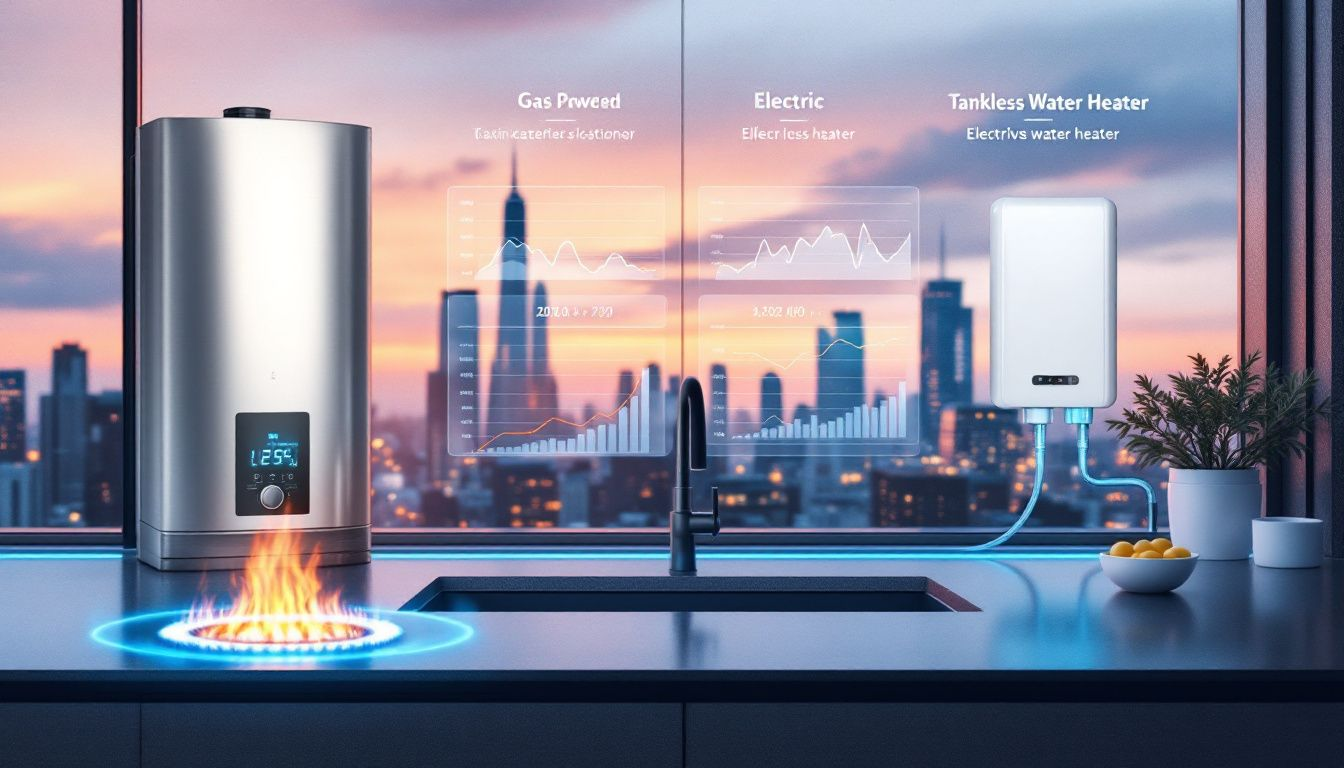Do Tankless Water Heaters Use Gas? Which Option is Best for You?
Yes, tankless water heaters can use gas. In fact, many homeowners wonder, “Do tankless water heaters use gas?” You also have electric and propane options. Each type has its own benefits and considerations. This article will explore these options, helping you decide which tankless water heater is best for your home.
Key Takeaways
Tankless water heaters provide on-demand hot water, improving energy efficiency by eliminating standby heat losses associated with traditional storage models.
Gas tankless water heaters are ideal for larger households due to higher flow rates and efficiency, while electric models offer easier installation and lower upfront costs.
When selecting a tankless water heater, consider household hot water demand, energy source availability, initial and long-term costs, and environmental impact.
Quick Links:
Understanding Tankless Water Heaters
Tankless water heaters operate differently from traditional tank models by heating water on demand rather than storing it in a tank. This means you can enjoy a continuous supply of hot water without the wait time and energy loss associated with storage tanks. The primary types of tankless water heaters are gas and electric, allowing homeowners to choose based on their specific needs and energy availability.
One of the significant benefits of tankless water heaters is their energy efficiency. They are designed to heat water only when needed, which can result in substantial energy savings over time compared to traditional tank models. These benefits need to be weighed against the higher initial cost and potential installation challenges.
How Tankless Water Heaters Work
Tankless water heaters work by heating water directly as it flows through the unit, without the need for a storage tank. When you turn on a hot water tap, water flows through the tankless heater, where a flow sensor activates the heating mechanism. This can be a gas burner or an electric element, depending on the model, which rapidly heats the water to the desired temperature.
This on-demand heating mechanism is highly energy efficient because it eliminates the standby heat losses associated with traditional hot water heaters. As a result, homeowners can enjoy continuous hot water while potentially reducing their energy bills.
Keep in mind the higher upfront costs and the necessity for professional installation to guarantee optimal performance and safety.
Types of Tankless Water Heaters
Tankless water heaters come in different types, primarily categorized into gas, electric, and propane models. Gas tankless water heaters use natural gas or propane to heat water, making them suitable for households with high hot water demands and access to gas lines. These models are known for their high flow rates and efficiency, especially in larger homes.
On the other hand, electric tankless water heaters use electric elements to heat water and are often more efficient in terms of energy conversion. They are generally smaller, less expensive to install, and more versatile in terms of placement. Additionally, an electric water heater can provide a reliable source of hot water, making electric water heaters a popular choice.
Propane tankless water heaters are a viable option for homes in rural areas without access to natural gas lines, offering similar benefits to their natural gas counterparts.
Do Tankless Water Heaters Use Gas?
Yes, tankless water heaters can use gas as a fuel source, in addition to electricity and propane. Gas tankless water heaters are particularly suitable for larger households due to their ability to deliver higher flow rates and handle higher hot water demands. Homes with access to natural gas often find gas tankless water heaters to be the best option due to their performance advantages.
Next, we’ll examine the different types of tankless water heaters, specifically gas, electric, and propane models. Each type has its own set of benefits and considerations, which we’ll explore to help you determine the best option for your home.
Gas Tankless Water Heaters
Gas tankless water heaters operate by using natural gas or propane to heat water as it flows through a heat exchanger. These units are known for their high efficiency ratings, typically ranging from 90% to 98%, making them a highly efficient option for heating water. The higher flow rates and better efficiency ratings make gas tankless water heaters ideal for larger households and colder climates.
However, gas tankless units usually require a BTU range of 150,000 to 199,000 or more and need proper venting for combustion gases. This means that installation can be more complex and may require professional assistance to ensure proper setup and compliance with safety standards.
Electric Tankless Water Heaters
Electric tankless water heaters achieve high efficiency by converting nearly all electricity into heat, with efficiency ratings ranging from 98% to 99%. These models are cost-effective over time due to their lower energy costs and the absence of exhaust gases. Electric tankless water heaters are typically rated between 3.0kW to 36kW, and when sized appropriately, they can provide high flow rates.
Additionally, electric tankless water heaters are less expensive upfront and more versatile in terms of installation location, as they do not require venting. This makes them an attractive option for smaller households or as a supplement to existing tankless heaters.
Propane Tankless Water Heaters
Propane tankless water heaters are an excellent option for homes without access to natural gas, particularly in rural areas. These units operate similarly to natural gas models, using propane to heat water on demand. They offer the same benefits of high efficiency and the ability to deliver continuous hot water, making them suitable for various household sizes and needs.
In areas where natural gas lines are not accessible, propane tankless water heaters provide a reliable and efficient alternative. They ensure that even remote homes can enjoy the benefits of on-demand hot water without compromising on efficiency or performance.
Comparing Gas and Electric Tankless Water Heaters
When deciding between gas and electric tankless water heaters, several factors need to be considered, including efficiency, installation requirements, and maintenance. Gas models generally have higher initial costs but offer greater heating capacity and flow rates, making them suitable for larger households. On the other hand, electric models are typically more efficient and require less upkeep, making them a good option for smaller households or as supplementary systems.
We’ll compare the efficiency and energy costs, installation requirements, and maintenance needs of gas and electric tankless water heaters to help you make an informed decision.
Efficiency and Energy Costs
Efficiency ratings are crucial when evaluating tankless water heaters, as they indicate how effectively the unit converts energy into hot water. Electric tankless water heaters typically boast higher efficiency ratings. They often exceed 98%, especially when compared to gas models. The Energy Factor (EF) rating is a key measure of energy efficiency and can significantly impact operational costs.
Gas tankless water heaters, while slightly less efficient, may result in long-term cost savings due to their higher flow rates and ability to handle larger hot water demands. Therefore, the choice between a gas water heater and electric models can depend on your household’s specific needs and energy consumption patterns.
Installation Requirements
Installing a gas tankless water heater can be more complex and costly due to the need for gas lines, proper venting, and adherence to local building codes. Professional installation is recommended to ensure safety and compliance with regulations, which can add to the overall cost.
In contrast, electric tankless water heaters are easier and less expensive to install, as they do not require venting and only need electrical connections. However, it’s important to note that some homes may require an electrical system upgrade to support the power needs of an electric tankless water heater. Despite this, the overall installation costs for electric models are typically lower compared to gas models.
Maintenance and Longevity
Regular maintenance ensures the longevity and efficiency of tankless water heaters. Gas models generally require annual professional checks to ensure safe operation and to maintain their efficiency. With proper maintenance, tankless water heaters can last up to 20 years, offering long-term benefits.
Electric tankless water heaters often have longer lifespans due to fewer components that are prone to wear and tear. Regular maintenance, such as flushing the system to prevent mineral build-up, can further enhance their durability and performance.
Factors to Consider When Choosing a Tankless Water Heater
Choosing the right tankless water heater involves considering several factors, including household hot water demand, availability of energy sources, and initial and long-term costs. Tankless water heaters can be more energy efficient than traditional storage heaters, especially for homes with lower daily hot water usage.
We will explore these factors in detail to assist you in making an informed decision. Understanding your household’s specific needs and constraints is crucial to selecting the most suitable demand water heater tankless water heater.
Household Hot Water Demand
Understanding your household’s hot water demand is essential to ensure that the tankless water heater can meet your needs. To determine the necessary gallons per minute (GPM) for a tankless water heater, calculate the heaviest water usage in your household and the desired water temperature.
The flow rate of tankless water heaters typically ranges between 2 to 5 GPM, and it’s important to match the heater capacity to your household’s peak hour demand. For example, simultaneous use of multiple fixtures, such as showers and dishwashers, may require a higher GPM capacity to ensure adequate hot water supply.
Availability of Energy Sources
The availability of energy sources is a critical factor in choosing a tankless water heater. The choice between natural gas and propane often depends on existing home infrastructure and energy access. For homes without access to natural gas lines, propane tankless water heaters offer a viable alternative, providing similar benefits in terms of efficiency and performance.
Electric models are also a good option for homes with adequate electrical capacity, offering high efficiency and flexibility in installation. Evaluating the availability and costs of different energy sources can help you make an informed decision that aligns with your household needs.
Initial and Long-Term Costs
When considering the costs of tankless water heaters, it’s important to look at both the initial purchase price and long-term operating costs. Gas tankless water heaters typically range in price from $499 to $1900, while electric models are generally lower in initial cost.
Gas models tend to have lower operating costs because gas prices are generally lower than electricity rates, making them more economical over time. However, water heating accounts for a significant portion of the total utility bill, so it’s crucial to consider future energy prices when evaluating long-term costs.
Environmental Impact of Gas and Electric Tankless Water Heaters
The environmental impact of your tankless water heater is an important consideration, particularly as the focus on sustainability and reducing carbon footprints grows. Electric tankless water heaters are generally seen as more environmentally friendly because they produce no greenhouse gas emissions during operation. They can also be powered by renewable energy sources like solar and wind, further enhancing their sustainability.
Gas tankless water heaters, while efficient, still rely on natural gas or propane, which are non-renewable resources. The combustion process produces emissions, including unburnt methane, which is a potent greenhouse gas.
We’ll delve deeper into the carbon footprint and sustainability of these energy sources.
Carbon Footprint
Gas tankless water heaters have a significant carbon footprint due to emissions from natural gas or propane combustion. These emissions contribute to higher greenhouse gas levels, which have a detrimental impact on the environment. In contrast, electric tankless water heaters have a lower carbon footprint, especially when the electricity used is generated from renewable sources.
However, it’s important to consider the source of the electricity. If the electric grid is primarily powered by fossil fuels, the environmental benefits of electric tankless water heaters may be diminished. Therefore, the overall carbon footprint of electric models can vary significantly based on the local energy mix.
Energy Source Sustainability
The sustainability of the energy sources used to power tankless water heaters is a key factor in their environmental impact. Natural gas, while cleaner than other fossil fuels, remains a non-renewable resource and contributes to greenhouse gas emissions. Moreover, the extraction and transportation of natural gas can lead to additional environmental impacts.
Electric tankless water heaters, on the other hand, can be powered by renewable energy sources, making them a more sustainable option. As the electricity grid moves towards 100-percent clean energy, the emissions associated with electric tank water heater models are expected to decrease further. This makes electric models a more attractive choice for environmentally conscious consumers.
Installation and Maintenance Tips
Proper installation and regular maintenance are crucial to ensuring the optimal performance and longevity of your tankless water heater. Selecting the right model for your needs and ensuring it is installed by experienced professionals can help you maximize the benefits of your tankless water heater. Regular maintenance tasks can also keep your heater running efficiently and extend its lifespan.
We’ll provide tips on professional installation and regular maintenance to help you maximize the benefits of your tankless water heater.
Professional Installation
Hiring professionals for the installation of your tankless water heater is essential for ensuring safe operation and compliance with local building codes. Professional installers are knowledgeable about local regulations and can ensure that your installation meets all safety standards.
A professional installation can also enhance the operational efficiency of gas tankless water heaters, contributing to lower energy costs and improved performance. By mitigating the risks associated with improper setup, you can avoid potential hazards and ensure that your tankless water heater operates smoothly and safely.
Regular Maintenance
Regular maintenance is essential to keep your tankless water heater running efficiently and to prolong its lifespan. Annual maintenance checks are recommended for gas tankless water heaters to ensure safe and efficient operation.
Flushing the system regularly helps prevent mineral build-up that can impede performance. Using a commercial descaling solution or white vinegar is effective in cleaning the system from mineral deposits, ensuring that your heater continues to operate at peak efficiency.
Summary
In conclusion, choosing the right tankless water heater involves considering various factors, including household hot water demand, energy source availability, and initial and long-term costs. Gas tankless water heaters offer higher flow rates and efficiency for larger households, while electric models provide higher energy efficiency ratings and installation flexibility for smaller homes or as supplementary systems.
Environmental considerations also play a crucial role, with electric tankless water heaters generally having a lower carbon footprint and greater sustainability potential when powered by renewable energy. Regular maintenance and professional installation are key to ensuring the optimal performance and longevity of your tankless water heater. By carefully evaluating your needs and the available options, you can make an informed decision that best suits your household.
Frequently Asked Questions
Do tankless water heaters use gas?
Yes, tankless water heaters can operate using natural gas, propane, or electricity as their fuel source. This flexibility allows for efficient hot water heating based on your energy preferences.
What are the benefits of gas tankless water heaters?
Gas tankless water heaters offer the advantage of higher flow rates, making them ideal for larger households with significant hot water needs. Additionally, they are highly efficient, with ratings typically between 90% to 98%.
How do electric tankless water heaters compare to gas models in terms of efficiency?
Electric tankless water heaters are typically more efficient than gas models, often achieving efficiency ratings over 98%. This makes them a superior choice for those prioritizing energy efficiency.
What factors should I consider when choosing a tankless water heater?
When choosing a tankless water heater, consider your household's hot water demand, the availability of energy sources, initial and long-term costs, and the environmental impact. These factors will ultimately help you select the best system for your needs.
How can I ensure my tankless water heater operates efficiently?
To ensure your tankless water heater operates efficiently, perform regular maintenance by conducting annual checks and flushing the system to prevent mineral build-up. This will enhance performance and extend its lifespan.






